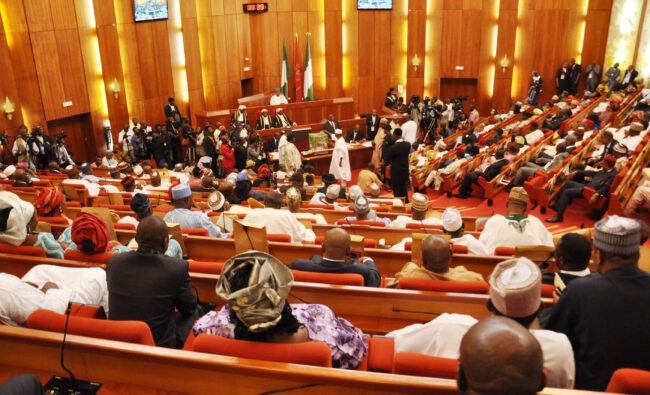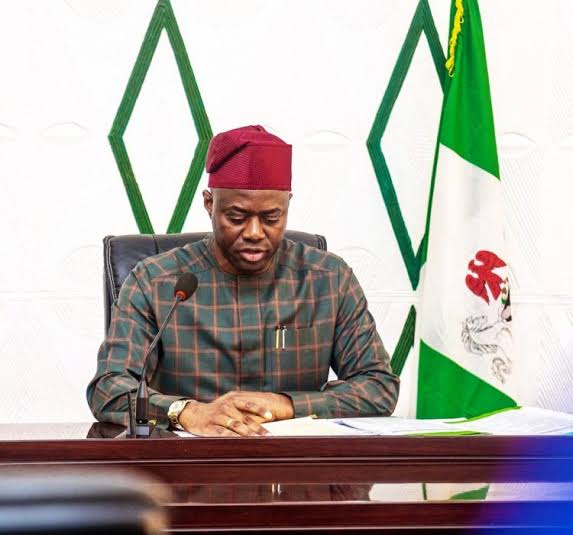BY MACK OGBAMOSA
The crises arising from the recent EndSARS protests have again brought to the fore the need to have a government that will address socio-economic inequalities in the society and be accountable to the people. This has not been the case. Most of our governments since political independence in 1960 have neither addressed socio-economic inequalities nor shown any reasonable level of accountability to the people. This has resulted in a society where the governed feel alienated from the government; where patriotism is lacking; where material deprivation is to the extreme; where there is high level of unemployment; where education is not considered a priority; where there is profligacy in government and where there is increasing level of crime and criminality.
Unfortunately, our 1999 Constitution, which provided for the treatment of these issues under Fundamental Objectives And Directive Principles of State Policy in Chapter II , made a counter provision vide Section 6.6(c) of the same Constitution which hinders their realization by stating that the issues are not justiciable. This has contributed largely to the state of affairs we have in our country today. The Constitution provided for two types of rights in Chapters II and IV. While the rights in Chapter II are called socio-economic and cultural rights, those in Chapter IV are called civil and political rights.
While the rights in Chapter IV are justiciable, those in Chapter II are not, According to Section 6.6(c) of the Constitution: ‘’The judicial powers vested in accordance with the forgoing provisions of this section- Shall not ,except as otherwise provided by this Constitution ,extend to any issue or question as to whether any act or omission by any authority or person or as to whether any law or any judicial decision is in conformity with the Fundamental Objectives and Directive Principles of State Policy set out in Chapter II of this Constitution’’
Advertisement
Under the Fundamental Objectives and Directive Principles of State Policy in Chapter II, the State is assigned certain political, economic, social, educational ,environmental, foreign and cultural objectives. We are told in Section 14(2b) that the security and welfare of the people shall be the primary purpose of government. Section 16(2 a-d) states : The State shall direct its policy towards ensuring – The promotion of a planned and balanced economic development ; that the material resources of the nation are harnessed and distributed as best as possible to serve the common good ;that the economy is not operated in such a manner as to permit the concentration of wealth or the means of production and exchange in the hands of a few individuals or of a group; and that suitable and adequate shelter ,suitable and adequate food, reasonable national minimum living wage, old age and pensions, and unemployment, sick benefits and welfare of the disabled are provided for all citizens. Section 17 (3) provides that: The State shall direct its policy towards ensuring that- all citizens without discrimination on any group whatsoever, have the opportunity for securing adequate means of livelihood as well as adequate opportunity to secure adequate employment. Section 18(3) states that: Government shall strive to eradicate illiteracy ; and to this end Government shall as and when practicable provide-
(a) Free, compulsory and universal primary education;
(b) Free secondary education;
(c) Free university education
(d) Free adult literacy programme.
Unlike what obtains in Chapter II, the rights in Chapter IV under Fundamental Human Rights, which include: Right to life, Right to dignity of human person, Right to personal liberty, Right to private and family life, Rights to freedom of thought, conscience and religion, Right to freedom of expression and the press, Right to peaceful assembly and association ,Right to freedom from discrimination, Right to acquire and own immovable property anywhere in Nigeria are justiciable.
Advertisement
REASONS FOR NON-JUSTICIABILITY OF CHAPTER II
There have been many arguments on the rationale or otherwise for the non-justiciability of Chapter II of our Constitution. One of these arguments is that Nigeria must have been influenced by the notion in international law where socio-economic rights are differentiated from civil and political rights. According to Nwauzi Linus in Justiciability of Fundamental Objectives and Directive Principles of State Policy: Under the 1999 Nigerian Constitution, International Journal of Law ISSN 2455-2194, Volume 3, Issue 5, September 2017, pages 29 – 37:“At international law, arguments against justiciability of economic, social and cultural rights underlie the division of human rights into two- civil and political rights on the one hand, and economic, social and cultural rights on the other. This also gave rise to two separate international covenants namely – the International Covenant on Civil and Political Rights ; and the International Covenant on Economic, Social and Cultural Rights.”
He explained that the differentiation between the two types of rights as provided in chapters 11 and 1V of our constitution originated during the cold war between the Eastern bloc led by the then Soviet Union and the Western bloc led by the United States soon after the Second World War. This is said to have ultimately reflected in the position of International law towards the justiciability or otherwise of the two categories of rights.
Although, the Universal Declaration of Human Rights adopted by the United Nations on December 10, 1948 and the African Charter on Human and People’s Rights did not differentiate between the two categories of rights, it is argued that the ideological differences between the two power blocs caused the division leading to the creation of two international covenants – the International Covenant on Civil and political Rights (ICCPR) and the International Covenant on Economic, Social and Cultural Rights (ICESCR). The two covenants were to be applied differently. Ellen Willes in Aspirational Principles or Enforceable Rights? The Future for socio-Economic Rights in National Law (22(1) American University International law Review 35 – 64 at 38 (2006) stated that : ’’ Whereas in the International Covenant on Civil and Political Rights, the rights are subjects of immediate obligation , in the International Covenant on Economic, Social and Cultural Rights, they are to be achieved by the more tangible notion of “progressive realisation”.
Advertisement
Apart from the fact that Nigeria must have been influenced by this notion in international law which clearly distinguishes between socio-economic rights and civil and political rights, the drafters of our 1979 Constitution ( where Chapter II provisions first appeared) were said to have been persuaded by the following arguments:
The first of these arguments, according to Adeoye Akinsanya in : Fundamental Objectives and Directive Principles of State Policy in the Nigerian Constitution 46(2) Pakistan Horizon 23-41 @ 32-33 (1993), is that the drafters believed that wealth must be created before it can be distributed.
Secondly, they contended that it would be dangerous from a political standpoint to arouse expectations that cannot be fulfilled, thus leading to a revolution of rising frustrations. Thirdly, while maintaining the position that socialist economies tend to be less efficient than free enterprise economies, they asserted that it was difficult to pursue the two goals of rapid development and extreme forms of income at the same time.
Fourthly, they believed that to make these provisions justiciable would only lead to constant confrontation between the executive and/or the legislature on the one hand and the judiciary on the other.
Fifthly, they also believed that the provisions by their nature related to policy goals or directions rather than to the existence or extent of legal rights vested on any individual or group normally subject to the jurisdiction of the court. To them, it was a field in which professional lawyers who preside over courts of law were not necessarily the most competent judges.
Sixthly, the provisions were new and no one could be too confident of the most appropriate method of ensuring their observance.” There is also the argument that states do not have the resources to implement socio-economic rights and therefore will need time to acquire such resources. To align It with this position, it is stated in Chapter II of our Constitution, for instance, that Government shall strive to eradicate illiteracy and provide free education… when practicable.
Advertisement
Another argument against the justiciability of socio-economic rights in Chapter II is that allowing citizens to take government to court for not granting them such rights will amount to encroachment of the judiciary into the powers of the executive, which is a negation of the principles of Separation of powers. It is also argued the poor will not benefit from judgement from access to justice because they cannot afford to bring cases to court for adjudication.
The legal possibility of enforcing socio- economic rights has also been questioned. It is believed that such rights lack conceptual clarity and certainty. For instance, how do you define minimum standard of health?; how do you measure adequate housing or suitable employment?
There is even the argument that the clause in Section 6.6(c) which makes Chapter II non-justiciable is not holistically directed at socio-economic rights but at all the contents of the Chapter. In A G Ondo V A G Federation (2002) NWLR(pt 772) 418, the Supreme Court stated that the provisions of a statute (including the Constitution) must be read in their plain and ordinary meaning which best give their meaning where they are clear and ambiguous.
Another argument is that since the mass media has been constitutionally given the role to monitor governance and make the government accountable to the people by ensuring that the Directive Principles of State policy in Chapter II are realised, there was no need for the judiciary to be given the same role. In other words, what the Constitution denied the judiciary, it gave to the press, making it the Fourth Estate of the Realm. Section 22 of our constitution states: ” The press, radio, television and other agencies of mass media shall at all times be free to uphold the fundamental objectives contained in this Chapter and uphold the responsibility and accountability of the Government to the people ”
Advertisement
ARGUMENTS THAT S 6.6 C) IS NOT A HINDRANCE TO JUSTICIABILITY
It is argued that even though Section 6.6(c) declared Chapter II not justiciable, the legislature still has powers to confer actionable rights on the contents of the Chapter vide Item 60(a) of the Exclusive Legislative (part 1 Second Schedule ) of the 1999 Constitution which empowers the National Assembly to make laws for the ” establishment and regulation of authorities…to promote and enforce the observance ” of Chapter II of the Constitution. When the legislature takes a step in this direction, S 6.6(c) will become impotent and right of access to court for enforcement of such rights by aggrieved citizens will be boosted.
In AG Ondo V AG Federation 2002 NWLR (pt 772) , the court ruled that ” Notwithstanding Section 15 of the 1999 Constitution, the EFCC Act was validly made to stamp out corruption as contained in Chapter II of the Constitution and in line with Item 60 of the Exclusive Legislature List. Section 15(5) states: ‘’The State shall abolish all corrupt practices and abuse of power.’’
Advertisement
It has also been argued that non- JUSTICIABILITY of Chapter II is not a hindrance to government to perform its obligations as Section 13 of the Constitution provides that all organs of government shall enforce the provisions of
Chapter II.
Advertisement
But in Archbishop Okogie V AG of Lagos State( 1981) 2 NCLR 337, the archbishop challenged a circular of the Lagos State Government which was aimed at abolishing private schools in the state on the grounds that the government was implementing the provisions of Chapter II of the then 1979 Constitution (which provisions are the same with that of 1999) on education. There were other issues bordering on Sections 16, 18 and 36. The court ruled that although Section 13 makes a duty for all organs of government to conform and apply the provisions of Chapter II, Section 6.6(c)) makes it clear that no court has jurisdiction to pronounce any decision as to whether any organ of government is doing so , therefore Section 13 has not made Chapter II justiciable.
It is the belief in many quarters that since Nigeria is a signatory to the African Charter on Himan Rights vide the African Charter on Human and People’s Rights(Ratification and Enforcement Act Cap 10 , Laws of the Federation of Nigeria (LFN),which does not discriminate between the two types of rights, it means that socio-economic rights are actionable in Nigeria, notwithstanding the provision in S6.6(c) of the Constitution.
In the Registered Trustees of Socio-Economic Rights and Accountabilty Project (SERAP) V President, Federal Republic of Nigeria and Universal Basic Education Commission Suit No ECW/CCJ/APP/08/08 ruling delivered on the 27th of October, 2009, the ECOWAS Court of Justice held that the rights quaranted by the African Charter on Human and people’s Rights are justiciable before the Court. It also held that every Nigerian has a right to education which can be enforced before the court.
In Fawehinmi V Abacha 51 WPH 1 @ 83- 85 per Ogundare JSC , it was held that where there is a conflict between a local statute and the African Charter, the provisions of the African Charter will prevail. In SERAP V Nigeria, 2001AHRLR 60 ,it was also held that Nigeria has the duty to give effect to the provisions of the African Charter.
In a Court of Appeal case, Oronto Douglas V Shell Petroleum Development Ltd (1992) 2NWLR (pt 591), 466, the Court endorsed the justiciability of an action brought pursuant to Article 24 of the African Charter on Human Rights( Ratification and Enforcing Act)
But the question is: How effectively have these judgements hinged on the African Charter been enforced?
WHY CHAPTER II SHOULD BE JUSTICIABLE
This writer strongly believes that for the nation to combat its governance crises, there should be clear provision on the justiciability of Chapter II of the constitution. The notion that Nigeria is a poor country and therefore does not have the resources to meet the obligations of the state to its citizens as spelt out in Chapter II of the Constitution is not correct. On the contrary, we have more than enough resources to provide free education for our citizens. The problem is that we are yet to prioritise education as a national challenge due largely to the attitude of our profligate and selfish leaders.
The argument that socio-economic rights are vague and cannot be defined does not hold water. What is vague in defining free education and suitable employment ? It is also not true that the poor will not benefit from the Justiciability of Chapter II because they would not have access to Justice. Our legal system provides room for the poor to have access to justice. In Tajudeen Bello v The State, it was held that failure of the state to assign a legal practitioner to defend an accused person charged with a capital offence amounts to a denial of fair hearing under Section 33 of the 1979 Constitution (now Section 36 of the 1999 Constitution.
The enforcement of socio- economic rights in Chapter II through the application of the Arican Charter on Human and Peoples Right has not been effective as no notable judgement given by our courts using the instrument of the Charter has been enforced. The argument that allowing citizens to take government to court on issues based on Chapter II will amount to encroachment on the role of the executive by the judiciary is not correct. Interpreting the Constitution does not amount to interference by the judiciary. It is left for the executive to implement.
The argument that the mass media has been constitutionally empowered in Section 22 to monitor governance and hold government accountable to the people; therefore in a position to ensure the enforcement of the rights in Chapter II is not correct. Although, the mass media was given a role by the Constitution, it was not empowered to perform this role.
The mass media as constituted in this country is too weak to engage in such an exercise due primarily to poor remuneration, lack of professionalism and unsuitable working conditions for the practitioners. Beyond that, freedom of expression as enshrined in the Constitution is for the generality of the citizenry, not for mass media practitioners only .In The Senate V Tony Momoh (1983)4NCLR 269, the court held that the press is not a fourth estate of government and that there was nothing in sections 21 and 36 of the 1979 Constitution (now 22 and 39 of the 1999 Constitution) which entitled the pressman to any separate treatment other than the one granted to the ordinary citizen.
Since the Cold War which originated the distinction in the treatment of the rights in Chapter II and those in Chapter IV is over, is it not time we harmonise them for the benefit of the people? The Soviet Union has collapsed. The world is gradually becoming a global village. There is need to enforce all the rights whether civil , political or socio-economic as originally spelt out in the Universal Declaration of Human Rights and the African Charter on Human and Peoples Rights.
BENEFITS OF ENFORCING SOCIO- ECONOMIC RIGHTS THROUGH JUSTICIABILITY OF CHAPTER II IN NIGERIA.
This is one sure way to promote accountability in government, thereby avoiding issues like the recent EndSARS protests. It will help us in the war against corruption as resources being diverted through corrupt means will be utilized for the people. When citizens are aware they can ask for their rights to education and employment , they will be less prone to crime and criminality. Justiciability of Chapter II will definitely improve our standard of living as well as prompt the essence of our democracy.
In the words of Akin Ibidapo-Obe, (Essays on human Rights Law in Nigeria: The Role of The Press Under The Third Republic Constitution; Concept Publications Limited;2005,p117), ‘’. In fact to assert that issues pertaining to governance are not amenable to justiciability is to lose sight of the very essence of a democratic government’’
For Taiwo A Olaiya, ( Interrogating the Non-justiciability of Constitutional Directive Principles and Public Policy Failure in Nigeria, Journal of Politics and Law, Vol 8,No 3 , 2015) : “There is need to be more constitutional in all aspects of the formulation of social right policies to prevent abuse in the highest possible regards, and, most importantly ensure popularity of the policies as the constitution is the mother law that a good number of members of the society are familiar with; and the prevailing situation of lack of assertive position by the Courts between the provisions of Section 6.6(c) of the 1999 Constitution and Article 24 of the International Covenant on Economic and Social Rights (ICESCRS) should be resolved, either by outright amendment to the relevant part of the constitution or by the legislature exercising its power in Item 60(a) of the Exclusive Legislative List.”
As pointed out by G N Okeke in Fundamental Objectives and Directive Principles of State Policy: A Viable Anti Corruption Tool in Nigeria, Nnamdi Azikiwe University , Journal of International Law and Jurisprudence, Vol 2, 175-184,(2011): ‘’As beautiful as these objectives are for the realisation of enduring policies against profligacy in Nigeria, the anti thesis provided within the same constitution in Section 6 most probably accounted for the recurring crisis of corruption in Nigeria. ” The drawback to the appropriation of these “dreams or objectives by citizens as of right is the provision in Section 6, Sub 6, paragraph c of the 1999 Constitution which makes the objectives non- justiciable. There is an urgent need to delete the above provision from the Constitution and subject the objectives to binding governmental obligations known as constitutional projects which will encourage the use of public fund for common good.’’
As stated earlier, I believe that most of our crises in governance including low level of political participation. Lack of accountability of our leaders, Poverty, high level of crime and criminality , wastefulness of our State resources by politicians and malfeasance as well as appointments into government positions on the basis of come and chop will be reduced if our Constitution is amended to make the Fundamental Objectives and Directive Principles of State Policy in Chapter II justiciable. Human rights as provided for in Chapter IV are hardly meaningful to a poor and hungry citizen. As far as such a citizen is concerned, it is the rights in Chapter II which can improve his material condition that make meaning to him.
We must remember that the EndSARS protesters were clamouring for good governance. This is what should be our concern. Afterall, the primary purpose of government as spelt out in Chapter II is the security and welfare of the people.
Ogbamosa, a legal practitioner based in Lagos, can be reached via [email protected]
Views expressed by contributors are strictly personal and not of TheCable.






